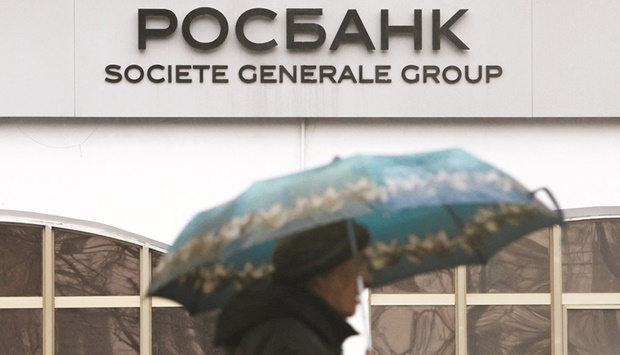French bank Societe Generale said on Monday it would quit Russia and take a €3bn ($3.3bn) income hit from selling its Rosbank unit to Interros Capital, a firm linked to Russian oligarch Vladimir Potanin.
Rosbank will rejoin the business empire of Potanin, the 61-year-old head of mining giant Norilsk Nickel, who has been sanctioned by Canada under western moves against Russia’s business and political elite over its invasion of Ukraine.
He has not been sanctioned by the European Union or the United States.
While financial terms of the deal were not announced, SocGen said Interros had agreed to pay off Rosbank’s subordinated debt.
It said the hit to its capital buffers was just 20 basis points and it was sticking to its share buyback and dividend plans.
SocGen had previously flagged the risk of a write-off on its 99% stake in Rosbank and investors welcomed the removal of uncertainty, sending its shares up as much as much as 8%.
“The announcement of the exit of Russia is positive for SocGen shares as it clarifies the impact of SocGen’s exposure to Russia,” analysts at Jefferies said in a note.
But the sale to Potanin was not universally applauded.
“It’s a bit distressing that ultimately this is an enormous gift to one of the wealthiest oligarchs,” said Jerome Legras, head of research at Axiom Alternative Investments.
France’s finance ministry declined to comment when asked whether the government had a role in negotiations.
It declined to comment on Potanin’s status as a sanctioned individual.
Russia’s invasion of Ukraine, which Moscow describes as a “special operation”, has prompted a wave of foreign companies to shutter their Russian businesses.
Orchestrating a complete break is, however, more difficult due to sanctions and political sensitivities.
Legras at Axiom Alternative Investments said SocGen’s Russian exit put pressure on others to act.
The French bank is the first among major banks to exit, with European rivals including Italy’s UniCredit and Austria’s Raffeisen still considering their futures in Russia. Asked whether SocGen’s deal meant other companies could sell their assets to Russian buyers, Kremlin spokesman Dmitry Peskov said on Monday: “This depends on the decision of an owner of a specific company which is leaving Russia”.
SocGen said the deal would allow it to exit Russia in an “an effective and orderly manner” and ensure continuity for Rosbank’s employees and clients.
Potanin’s holding company had owned Rosbank from 1998, before SocGen bought a stake in 2006 and merged it with its other Russian operations in 2010.
SocGen paid $317mn for its initial 10% stake in Rosbank.
Potanin, Russia’s second richest man with $27bn worth of assets according to Forbes magazine estimates, worked in the Soviet Union’s foreign trade ministry and later as a banker before establishing Interros in 1990, an umbrella for his assets which range from metals production to a ski resort.
During the 1990s, Potanin served as Russia’s first deputy Prime Minister, masterminding the first wave of privatisations of former state-owned and himself buying several large businesses, including a stake in mining giant Nornickel.
Following Moscow’s invasion of Ukraine, which began on February 24, Potanin said that confiscating assets from companies that had left Russia would shatter investor confidence for decades.
“Interros intends to make every effort to develop Rosbank’s business, considering the integration of digital technologies and products into the traditional banking services as a priority. The most important goal of Interros is to maintain the stability of Rosbank and create new opportunities for its clients and partners,” Potanin said in a statement.

The logo of Rosbank is seen at a bank branch in Moscow on Monday. Rosbank will rejoin the business empire of Potanin, the 61-year-old head of mining giant Norilsk Nickel, who has been sanctioned by Canada under western moves against Russia’s business and political elite over its invasion of Ukraine.
